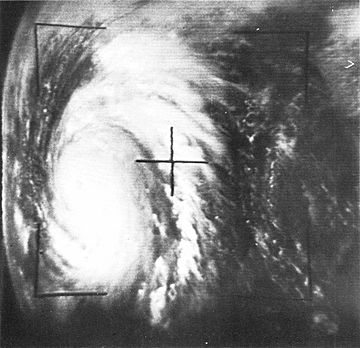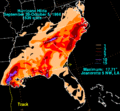Hurricane Hilda facts for kids
| Category 4 major hurricane (SSHWS/NWS) | |

Hilda at peak intensity on October 1
|
|
| Formed | September 28, 1964 |
|---|---|
| Dissipated | October 5, 1964 |
| (Extratropical after October 4) | |
| Highest winds | 1-minute sustained: 140 mph (220 km/h) |
| Lowest pressure | 941 mbar (hPa); 27.79 inHg |
| Fatalities | 38 |
| Damage | $126 million (1964 USD) |
| Areas affected | |
| Part of the 1964 Atlantic hurricane season | |
Hurricane Hilda was a powerful tropical cyclone, which is a huge spinning storm. It hit the U.S. Gulf Coast, especially Louisiana, in 1964. This hurricane caused a lot of damage on land. It also greatly affected oil platforms in the ocean. At the time, it was the most expensive storm for Louisiana's offshore oil industry.
Contents
What Was Hurricane Hilda?
Hurricane Hilda began as a tropical storm. It formed on September 28, 1964. Over the next few days, it grew much stronger. It became a major hurricane. This means it had very fast winds. Hilda reached its strongest point on October 1. Its winds were about 140 miles per hour. This made it a Category 4 hurricane.
Hilda's Path and Strength
Hilda moved across the Caribbean Sea. It passed near Cuba and the Yucatán Peninsula. These areas felt some of its strong winds and rain. As it moved into the Gulf of Mexico, it became even more powerful. It was a very large and dangerous storm.
Impact on the Gulf Coast
Hurricane Hilda made landfall in Louisiana. This happened on October 3, 1964. When it hit, it was still a very strong storm. It brought heavy rain and strong winds. These conditions caused a lot of problems.
Damage on Land
The hurricane caused widespread damage. Many homes and buildings were destroyed. Trees were knocked down everywhere. Power lines were also broken. This left many people without electricity. Flooding was a big issue too. The heavy rains caused rivers to overflow. This made the damage even worse.
Effect on Offshore Oil
One of Hilda's biggest impacts was on the oil industry. Many oil platforms are located in the Gulf of Mexico. These platforms drill for oil under the sea. Hilda's powerful winds and waves damaged many of them. Some platforms were completely destroyed. This stopped oil production for a while. It was a very costly event for the oil companies.
After the Storm
After hitting Louisiana, Hilda weakened. It moved inland and became a tropical depression. This means it was much less powerful. However, it still brought rain to other parts of the United States. The storm finally ended on October 5, 1964.
Remembering Hilda
Hurricane Hilda caused about $126 million in damages. This would be much more money today. Sadly, 38 people lost their lives because of the storm. Because of its severe impact, the name "Hilda" was retired. This means no future hurricanes will be named Hilda. This is done for storms that cause a lot of damage or deaths.
Images for kids
 | Selma Burke |
 | Pauline Powell Burns |
 | Frederick J. Brown |
 | Robert Blackburn |



